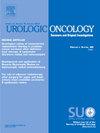膀胱癌成年患者未满足需求的年龄相关差异及其预测因素
IF 2.3
3区 医学
Q3 ONCOLOGY
Urologic Oncology-seminars and Original Investigations
Pub Date : 2025-07-04
DOI:10.1016/j.urolonc.2025.06.007
引用次数: 0
摘要
背景:膀胱癌对老年人的影响不成比例,因此解决特定年龄的未满足需求至关重要。了解社会人口学、临床和个人/社会资源因素如何影响未满足的需求,可以帮助临床医生提供量身定制的干预措施,以改善结果。目的:(1)检查老年患者未满足需求的差异方法:我们对膀胱癌倡导网络中18至85岁的成年人进行了横断面研究。未满足的需求被先验地确定(心理、卫生系统和信息、身体/日常生活、病人护理/支持、性、后勤、与配偶/伴侣的沟通以及与临床医生的沟通),并使用膀胱癌需求评估量表-32进行评估。采用单因素分析和后向模型选择来确定与患者未满足需求相关的社会人口学、临床和个人/社会资源变量。结果:总共纳入155例膀胱癌患者。结论:研究结果强调,需要针对年龄、患者性别和个人/社会资源如何影响未满足的需求,制定量身定制的支持性护理策略,以改善膀胱癌的护理和预后。本文章由计算机程序翻译,如有差异,请以英文原文为准。
Age-related differences in unmet needs and their predictors among adults with bladder cancer
Background
Bladder cancer disproportionately affects older adults, making addressing age-specific unmet needs essential. Understanding how sociodemographic, clinical, and personal/social resource factors influence unmet needs can help clinicians deliver tailored interventions to improve outcomes.
Objectives
(1) Examine differences in unmet needs for patients aged <65 and ≥65, and (2) determine sociodemographic, clinical, and personal/social resource factors associated with unmet needs for patients aged <65 and ≥65.
Methods
We conducted a cross-sectional study of survey data for adults aged 18 to 85 from the Bladder Cancer Advocacy Network. Unmet needs were identified a priori (psychological, health system and information, physical/daily living, patient care/support, sexuality, logistics, communication with a spouse/partner, and communication with clinicians) and assessed using the Bladder Cancer Needs Assessment Scale-32. Univariate analyses and backward model selection were used to identify sociodemographic, clinical, and personal/social resource variables associated with unmet needs for patients <65 and ≥65.
Results
Overall, 155 patients with bladder cancer were included. Patients <65 had more psychological, patient care and support, sexuality, and communication with spouse/partner unmet needs, while patients ≥65 had more health system and information unmet needs. Multivariable analyses revealed significant differences in associations between unmet needs and social support, self-efficacy, and maladaptive coping for each distinct age group. Differences in unmet needs by patient sex emerged, with women experiencing more unmet needs than men in the older group.
Conclusion
Findings underscore the need for tailored supportive care strategies accounting for how age, patient sex, and personal/social resources may impact unmet needs to improve bladder cancer care and outcomes.
求助全文
通过发布文献求助,成功后即可免费获取论文全文。
去求助
来源期刊
CiteScore
4.80
自引率
3.70%
发文量
297
审稿时长
7.6 weeks
期刊介绍:
Urologic Oncology: Seminars and Original Investigations is the official journal of the Society of Urologic Oncology. The journal publishes practical, timely, and relevant clinical and basic science research articles which address any aspect of urologic oncology. Each issue comprises original research, news and topics, survey articles providing short commentaries on other important articles in the urologic oncology literature, and reviews including an in-depth Seminar examining a specific clinical dilemma. The journal periodically publishes supplement issues devoted to areas of current interest to the urologic oncology community. Articles published are of interest to researchers and the clinicians involved in the practice of urologic oncology including urologists, oncologists, and radiologists.

 求助内容:
求助内容: 应助结果提醒方式:
应助结果提醒方式:


